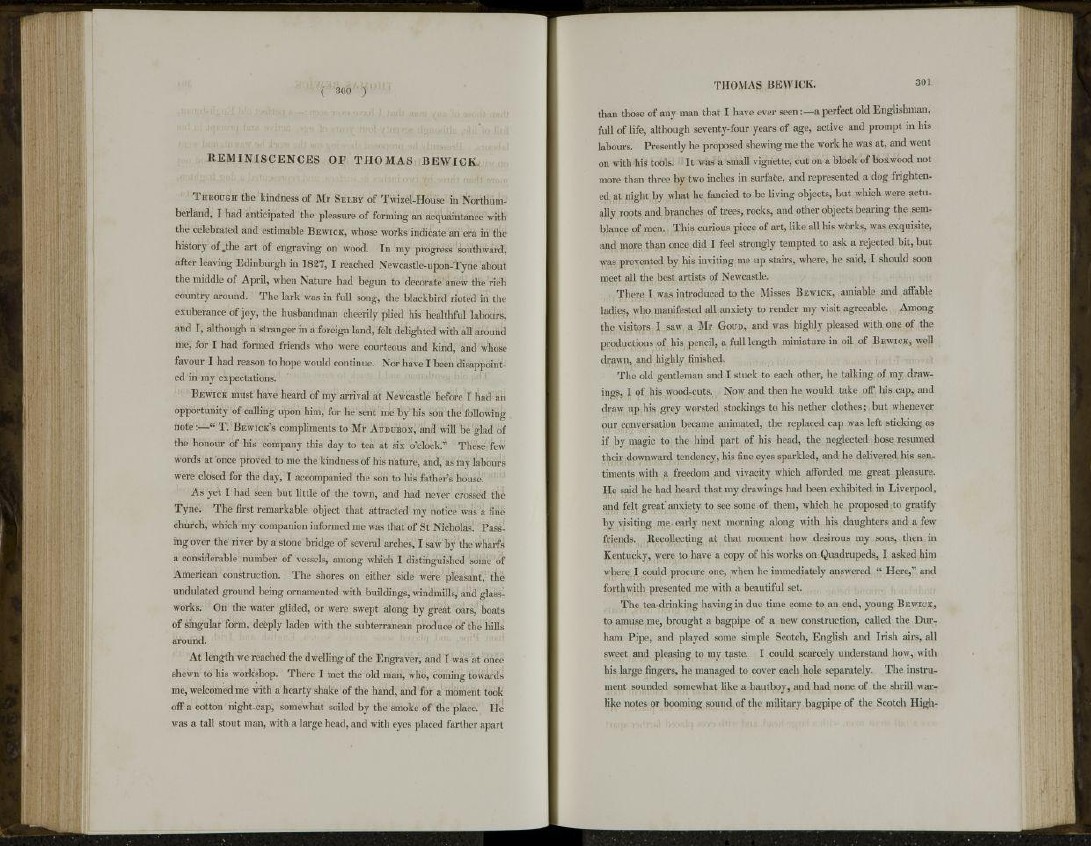
REMINISCENCES OF THOMAS BEWICK.
THROUGH the kindness of Mr SELBY of Twizel-House in Northumberland,
I had anticipated the pleasure of forming an acquaintance with
the celebrated and estimable BEWICK, whose works indicate an era in the
history of #the art of engraving on wood. In my progress southward,
after leaving Edinburgh in 1827, I reached Newcastle-upon-Tyne about
the middle of April, when Nature had begun to decorate anew the rich
country around. The lark was in full song, the blackbird rioted in the
exuberance of joy, the husbandman cheerily plied his healthful labours,
and I, although a stranger in a foreign land, felt delighted with all around
me, for I had formed friends who were courteous and kind, and whose
favour I had reason to hope would continue. Nor have I been disappointed
in my expectations.
BEWICK must have heard of my arrival at Newcastle before I had an
opportunity of calling upon him, for he sent me by his son the followingnote
:—" T. BEWICK'S compliments to Mr AUDUBON, and will be glad of
the honour of his company this day to tea at six o'clock.'11 These few
words at once proved to me the kindness of his nature, and, as my labours
were closed for the day, I accompanied the son to his father's house.
As yet I had seen but little of the town, and had never crossed the
Tyne. The first remarkable object that attracted my notice was a fine
church, which my companion informed me was that of St Nicholas. Passing
over the river by a stone bridge of several arches, I saw by the wharfs
a considerable number of vessels, among which I distinguished some of
American construction. The shores on either side were pleasant, the
undulated ground being ornamented with buildings, windmills, and glassworks.
On the water glided, or were swept along by great oars, boats
of singular form, deeply laden with the subterranean produce of the hills
around.
At length we reached the dwelling of the Engraver, and I was at once
shewn to his workshop. There I met the old man, who, coming towards
me, welcomed me with a hearty shake of the hand, and for a moment took
off a cotton night-cap, somewhat soiled by the smoke of the place. He
was a tall stout man, with a large head, and with eyes placed farther apart
THOMAS BEWICK. 301
than those of any man that I have ever seen :—a perfect old Englishman,
full of life, although seventy-four years of age, active and prompt in his
labours. Presently he proposed shewing me the work he was at, and went
on with his tools. It was a small vignette, cut on a block of boxwood not
more than three by two inches in surface, and represented a dog frightened
at night by what he fancied to be living objects, but which were actually
roots and branches of trees, rocks, and other objects bearing the semblance
of men. This curious piece of art, like all his works, was exquisite,
and more than once did I feel strongly tempted to ask a rejected bit, but
was prevented by his inviting me up stairs, where, he said, I should soon
meet all the best artists of Newcastle.
There I was introduced to the Misses BEWICK, amiable and affable
ladies, who manifested all anxiety to render my visit agreeable. Among
the visitors I saw a Mr GOUD, and was highly pleased with one of the
productions of his pencil, a full length miniature in oil of BEWICK, well
drawn, and highly finished.
The old gentleman and I stuck to each other, he talking of my drawings,
I of his wood-cuts. Now and then he would take off his cap, and
draw up his grey worsted stockings to his nether clothes; but whenever
our conversation became animated, the replaced cap was left sticking as
if by magic to the hind part of his head, the neglected hose resumed
their downward tendency, his fine eyes sparkled, and he delivered his sentiments
with a freedom and vivacity which afforded me great pleasure.
He said he had heard that my drawings had been exhibited in Liverpool,
and felt great' anxiety to see some of them, which he proposed to gratify
by visiting me early next morning along with his daughters and a few
friends. Recollecting at that moment how desirous my sons, then in
Kentucky, were to have a copy of his works on Quadrupeds, I asked him
where I could procure one, when he immediately answered " Here," and
forthwith presented me with a beautiful set.
The tea-drinking having in due time come to an end, young BEWICK,
to amuse me, brought a bagpipe of a new construction, called the Durham
Pipe, and played some simple Scotch, English and Irish airs, all
sweet and pleasing to my taste. I could scarcely understand how, with
his large fingers, he managed to cover each hole separately. The instrument
sounded somewhat like a hautboy, and had none of the shrill warlike
notes or booming sound of the military bagpipe of the Scotch High